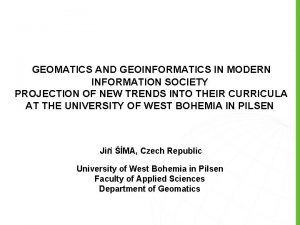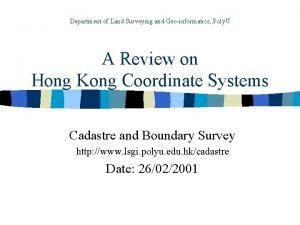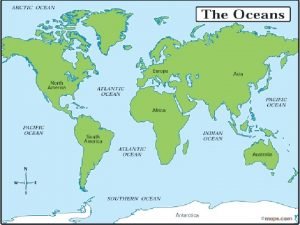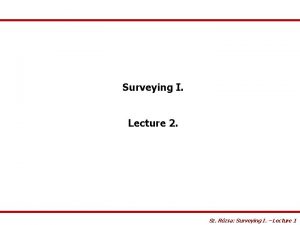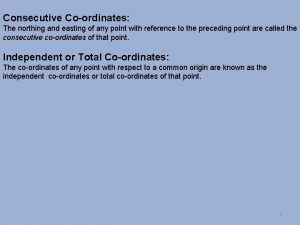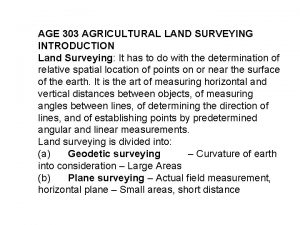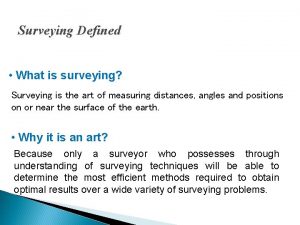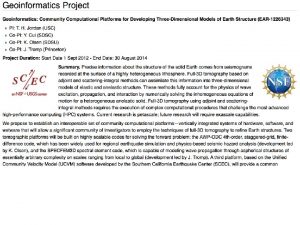Department of Land Surveying and Geoinformatics Poly U

















- Slides: 17

Department of Land Surveying and Geo-informatics, Poly. U A Review on Hong Kong Coordinate Systems Cadastre and Boundary Survey http: //www. lsgi. polyu. edu. hk/cadastre Date: 26/02/2001

Current Vertical Datum n Hong Kong Principal Datum (HKPD) – all heights and levels on land. – relationship to mean sea level. – Benchmark: Round Head Bolt, etc. n Chart Datum (CD) – all depths and heights above mean higher high water mark.

Current Horizontal Datum n Local Hong Kong 1980 Datum – Major Trilateration: Trigonometric (Trig. ) Station – Minor: Urban Survey Mark (USM), Picket box (PB) – Traverse: Iron spike (IS), Iron tube (IT), Lead plug (LP), Survey Nail (SN), Wooden Peg (Peg), & Cut Mark (CM).

Control Stations

Early Geodetic Control in HK n n First HK map showing Trig stations in 1845 by Lt. Collinson R. E. Another map produced by Tate and Newland in DD Survey 1899 -1904. No survey record found for triangulation, e. g. no methods mentioned. Uncertainty degree of accuracy.

1924/25 Main Triangulation n A military map of 1/20000 was produced from air photographs by the Royal Air Force with ground controls by the 2 nd Colonial Survey Section R. E.

First Triangulation Network n n n Controls adjusted by Geographical Section in 1928 -30. Re-adjusted by Crown Lands & Survey Office (CL&SO) in 1946 and adopted up to 1963. Values known as Old Imperial Values (feet); four quadrants appeared.

Old Imperial Coordinate System 1928

1963 Datum (New Imperial Values) n Why? Accuracy cannot meet requirements for large scale mapping & boundary surveys. (Retriangulation). n n Clarke 1858 as reference ellipsoid, Patridge Hill as datum origin, Cassini projection for grid system. Old Imperial to New Imperial – Northing + 50000 ft; Easting + 120000 ft. n Coordinates in HK territory - +ve values.

New Imperial Coordinate System 1963

Metrication- Old Metric Values n Why? Metrication policy in 1970 s, New Imperial grid was converted to metric unit of measure in 1975 -7. n n Feet to metre (x 0. 3048) Grid origin further shifted 3550 m to the West, i. e. (-3550 m E).

HK 1980 Grid Datum n Why? EDM technology, distance between Trig. resurveyed in 1978 -9 to improve the consistence and accuracy of control network (Trilateration). n n International Hayford 1910 as reference ellipsoid, same projection origin, Transverse Mercator projection for grid system. Northing + 800000 m; Easting + 800000 m.

HK 1980 Coordinate System

Nowadays n n 1990, Survey & Mapping Office (SMO) uses GPS for position fixing. Provides a link between local HK 80 Geodetic Datum and global WGS 84 Datum.

Scale of contemporary maps n n n DD Survey (1: 3960, 16 inches to 1 mile) and (1: 1980, 32 inches to 1 mile) 1963 Survey (1: 1200, 1 inch : 100 ft) for rural; (1: 600, 1 inch : 50 ft) for urban. Post 1980 (1: 1000)

Conversion Constants n n n As described, 4 different coordinate systems Different adjustment, instruments used, etc. Different control network shifted a certain level, i. e. directions, magnitude at different regions. Same shifting in local areas. A Pair of conversion constants applied.

Conversion Constants n Physical features for conversion: – Old control stations; – Permanent Survey Mark (PSM); – Boundary Stone, if available; – Old radiated points (shots).
 Geomatics and geoinformatics
Geomatics and geoinformatics Hk 1980 grid
Hk 1980 grid An area of land largely enclosed by higher land
An area of land largely enclosed by higher land Grassland landforms
Grassland landforms What does the word polygon mean in greek
What does the word polygon mean in greek Poly and gon
Poly and gon Rise and fall method surveying
Rise and fall method surveying Local attraction in surveying
Local attraction in surveying Surveying instruments ppt
Surveying instruments ppt Legal and general surveyors
Legal and general surveyors Reciprocal levelling
Reciprocal levelling Consecutive and independent coordinates in surveying
Consecutive and independent coordinates in surveying Repetition and reiteration method in surveying
Repetition and reiteration method in surveying Reiteration method in surveying
Reiteration method in surveying Vertical ne demek
Vertical ne demek About me
About me Degree works suny
Degree works suny N level to o level criteria
N level to o level criteria
